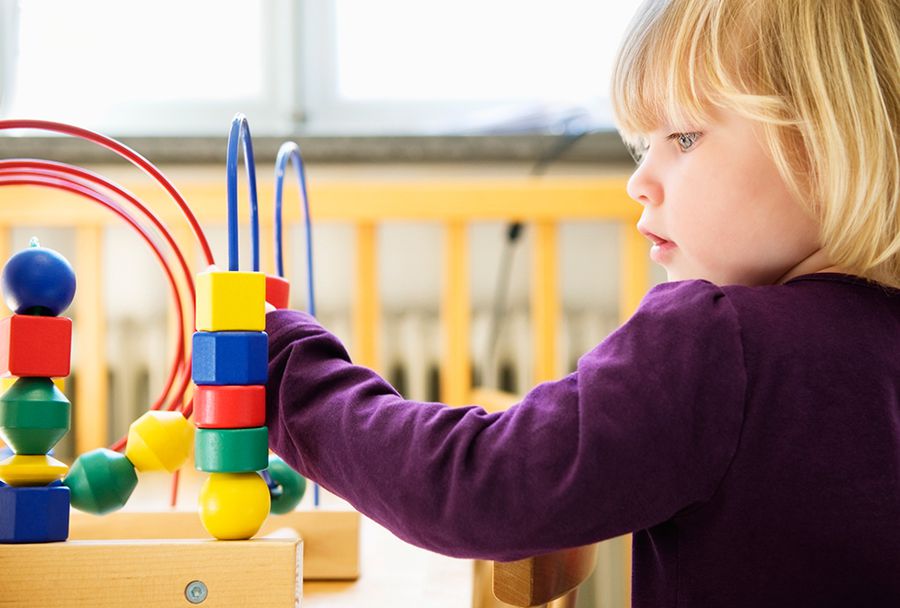
Choosing to send your child to daycare can be a difficult decision. From financial concerns to fears for your child’s safety, it’s a dilemma many parents face—and will face, time and time again. The issue has also been amplified (in large part) because of COVID-19. It can be hard to shield your little one from dangerous germs when they’re around other children all day long.
Daycare is necessary for so many families, so how do you keep your child safe? What can you do to ensure their health, happiness, and wellbeing? From licensing and background checks to health and safety precautions, here’s everything you should look for in a child care facility.
Child Care Licensing and Registration
The first thing you should do when selecting a child care and/or daycare facility is to ask for information about their licensing and registration. “Licensing does not guarantee quality,” an article on ChildCare.gov explains. “However, it sets minimum requirements and ensures that programs are monitored for compliance with these requirements.”
Child care licensing covers many topics, including:
- The number of children one adult can care for a time
- The overall safety of the building, such as emergency exits, cleanliness and repairs, and potential dangers
- Immunizations, handwashing, diapering, and other methods to stop the spread of disease
- Nutrition
Training, health, and other requirements for the adults working at the child care program are also regulated.
"Any safe and reputable daycare center should and NEEDS to be licensed," says Michael Dinneen, CEO & founder of Nanny City. "This license should be on display and readily available to anyone who requests to see it, and you should definitely ask to see their certification first."
Background Checks
After asking each daycare or child care facility about their licensing, you should inquire about background checks. Under federal law, criminal background checks must be conducted for both teachers and administrative personnel. These checks should verify that the adult doesn't have a history of violence and/or child abuse. Child care providers must also ensure that providers don't have a history of convictions that could put children's health and safety at risk.
You should also review the background of the center itself. "Check to see if the daycare has any prior violations," says Theresa Bertuzzi, chief program development officer and co-founder of Tiny Hoppers. "There should be no safety violations to the daycare, but if they do, ask about the preventative measures that have been put in place. The daycare should also require a vulnerable sector criminal record check for its employees."
Health and Safety
There are numerous things your child care provider should do to ensure the health and safety of their students and staff.
- All surfaces and objects should be cleaned and sanitized. This should be done frequently and thoroughly, especially for high-touch points (like light switches and door knobs).
- Toys should be disinfected between use and/or at the end of each day.
- Cots, if used, should be wiped down regularly.
- Bedding, if necessary, should be supplied by parents and sent in Ziploc bags. Note: Some schools may request that parents transport these items home at the end of each day.
- Sensory play (think water tables or sandboxes), plush toys, and other things that can't be easily cleaned should not be used, and every child should have their own supplies to limit contact. Shared crayons or scissors, for example, would be harder to clean during an activity.
Children and staff should also be encouraged to wash their hands frequently, especially before meals and after going to the bathroom. You should also keep your child up to date on their vaccines.
What's more, child care facilities should conduct daily health screenings and make note of marks, cuts, bruises, and/or broken bones. Parents should do similar checks at the beginning and the end of each day. This ensures there are no discrepancies between you and your child care provider. Suspected neglect or abuse should be reported immediately; pull your child from the school and contact local authorities.
You should also meet with teachers and administrators frequently, and speak up about any concerns. Keeping an open line of communication is key.
"Every daycare should have a safety policy in place that includes all procedures," says Kimberly King, mother and child safety expert. "Ask to see the handbook. Ask to see the mission safety. Be 'that' parent."
General Information
Other things to look for in a daycare include:
- Class size. When given the option, consider a smaller day care with fewer children or a place with smaller class sizes. This improves your child's overall safety and reduces the likelihood that they will get sick.
- Allergy prevention. While your child may not have allergies, you should still select a school which takes allergy prevention seriously. You never know when an emergency may arise.
- Recommendations and reviews. What are other parents saying about the facility? Does the daycare have more positive or negative reviews? Listening to feedback is important, for your child's health, safety, and overall wellbeing.
